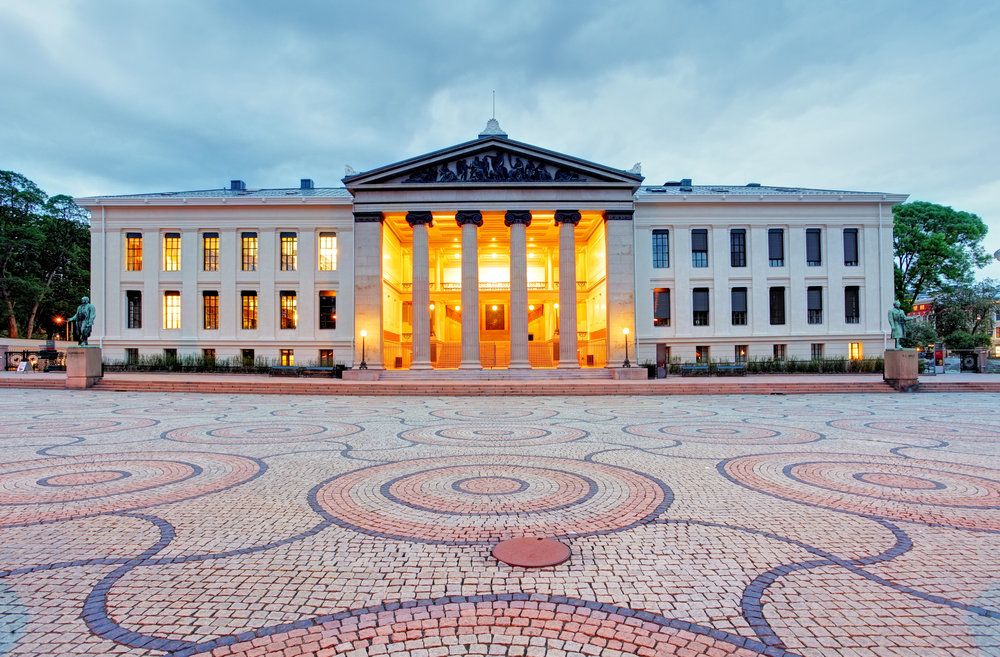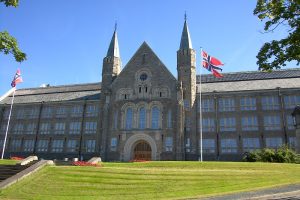
University of Oslo
The University of Oslo is a public research university located in Oslo, Norway, founded in 1811 and is the oldest university in Norway, It is the largest and highest-ranked university in Norway, with around 28,000 students and 6,000 employees. The university has a strong international reputation and collaborates with many universities worldwide. It participates in international exchange programs Notable academic achievements include having several Nobel Prize laureates among its faculty and alumni, as well as producing significant research in areas like climate science, energy, and public health
As Norway’s oldest and most prestigious university, UiO has educated many influential leaders in politics, business, culture, and academia. It plays a central role in shaping public debate and policy in Norway, with faculty members frequently serving as expert advisors to the government.
The university is deeply embedded in Oslo’s cultural fabric, hosting numerous public lectures, exhibitions, and events that engage the broader community.

Research
The university is home to renowned research centers and institutes, such as the Centre for Development and the Environment, the Fridtjof Nansen Institute, and the Centre for Ecological and Evolutionary Synthesis. Research at UiO covers areas like energy, climate, environment, health, culture, society, and technology. It has particular strengths in cancer research, polar science, and linguistics. Its research has had a significant impact in areas critical to Norway and the world, such as climate change, energy, and sustainable development.
Focus Areas
Climate and Environmental Studies: The university is at the forefront of climate change research, with experts contributing to the work of the Intergovernmental Panel on Climate Change (IPCC). Research areas include renewable energy, climate adaptation, and Arctic/polar studies. Health and Biomedicine: Researchers at UiO conduct groundbreaking work in fields like neuroscience, cancer biology, infectious diseases, and public health. The university has strong ties to Oslo’s world-class medical and research facilities.
Energy and Resources
The university leverages Norway’s oil, gas, and renewable energy expertise to drive innovation in energy storage, carbon capture, and sustainable resource management.
Social Sciences and Humanities
Prominent research areas include the welfare state, migration, equality, and the digital transformation of society. Researchers also contribute to policy debates and provide expert advice to the government.
Fundamental Sciences
The university has internationally renowned programs in mathematics, physics, chemistry, and computer science, with state-of-the-art research facilities like the NOvA neutrino detector.
Research and Funding
UiO researchers actively collaborate with partners from academia, industry, and government both in Norway and internationally. The university secures significant research funding from sources like the Norwegian Research Council, the European Union’s Horizon Europe program, and private foundations. It is a member of prestigious international research consortia such as CERN, the European Organization for Nuclear Research, and the Integrated Carbon Observation System (ICOS).
Research Infrastructure
The university has invested heavily in world-class research infrastructure, including cutting-edge laboratories, research centers, and specialized scientific equipment. It operates several interdisciplinary research institutes that bring together experts from different fields to tackle complex problems, The University has a strong emphasis on innovation and commercialization, with dedicated technology transfer and entrepreneurship support for researchers and students.
Campus and Student Life
The main campus is located in the heart of Oslo, spanning several city blocks with neoclassical buildings dating back to the 19th century, The campus houses several museums and cultural institutions, including the Natural History Museum and the Munch Museum. Other campuses and facilities are scattered across the greater Oslo region, including the Blindern campus for natural sciences and medicine.
The university operates some libraries, labs, and specialized research infrastructure to support its academic programs, The university has a vibrant student community with over 200 student organizations and clubs.
Housing is available on and off campus for both Norwegian and international students. Oslo offers a high quality of life for students, with a wide range of cultural, recreational, and social opportunities in the city. The university has strong ties to the Norwegian government and Oslo’s business community, providing internship and career opportunities for students.
The university has made a concerted effort to internationalize its educational offerings in recent years, recognizing the importance of attracting global talent and providing students with internationally-oriented learning experiences. The availability of high-quality English-medium instruction is a key part of this strategy.
Admission requirements
The admission requirements for the University of Oslo vary depending on the specific program and level of study, but here are some of the general requirements:
Undergraduate Programs
- Completion of upper secondary education (high school) or equivalent
- Minimum grade requirements (varies by program)
- Proficiency in the language of instruction (Norwegian or English)
- Submission of required application materials (application form, transcripts, etc.)
Graduate Programs
- Completion of a relevant bachelor’s degree or equivalent
- Minimum grade requirements (typically a B average or higher)
- Proficiency in the language of instruction (usually English)
- Submission of required application materials (application form, transcripts, letters of recommendation, statement of purpose, etc.)
Doctoral Programs
- Completion of a relevant master’s degree or equivalent
- Strong academic record and research experience
- Proposal for a doctoral research project
- Proficiency in the language of instruction (usually English)
- Submission of required application materials (application form, transcripts, research proposal, letters of recommendation, etc.)
International applicants may need to provide
Proof of English proficiency (e.g., TOEFL, IELTS, or equivalent)
Documentation of educational credentials and transcripts
Financial documentation (for student visa purposes)


